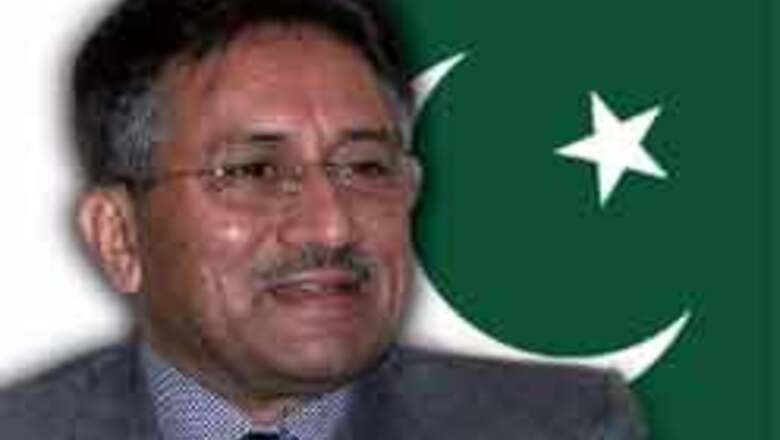
views
Washington: Noted American expert on South Asian Affairs, Selig Harrison, has urged the Bush Administration to withhold US aid to Islamabad until Pakistan ceases military activity in Baluchistan.
Speaking at a seminar organised by the US Institute of Peace, Harrison, who is the director of the Asia Program at the Center for International Policy, said, "In my view, future US military and economic aid to Islamabad should be withheld until Pakistan President Pervez Musharraf stops his military repression of Baluchistan and enters into serious negotiations with Baluch leaders.”
Harrison added “Pakistan is likely to become increasingly ungovernable in the absence of a political settlement with the Baluch."
He warned that continued military confrontation in Baluchistan could well intensify the long-simmering ethnic unrest in neighbouring Sindh and involving a variety of anti-Musharraf groups around Pakistan.
But despite the serious international implications the Baluch issue has not found mainstream attention in Washington.
Harrison blamed the lukewarm response to the near isolation of the region, particularly by the military, which has led to a huge sense of ambiguity about Baluchistan.
Harrison said with conflicting reports and disputed claims of chemical weapons and rights abuses, it’s tough to know exactly what's going on.
“This time it is harder to pin down the facts. We know that Pakistan still gets Sui gas from Baluchistan to meet 22 per cent of its gas needs. We know that the central government has consistently refused to pay fair royalties for that gas to Baluchistan for its development."
"But just what is happening militarily right now in Pakistan and Baluchistan is really not clear, because the army itself doesn't even officially acknowledge that there is an operation in Baluchistan and hasn't admitted that and so its been able to keep most journalists out,” he said.
But Harrison is convinced it is a policy the US needs to change as a stable Pakistan was in Washington’s strategic interests, particularly with respect to its war on terror.
“This policy in my view should be reversed, not only to stop the carnage, but also because the US has a major strategic stake in a peaceful accommodation between Islamabad and Baluch leaders,” Harrison said.
Frederic Grare, an expert attached with the Carnegie Endowment for International Peace further said the issue could become a cauldron of fresh tension with neighbour Afghanistan, which has been at a bitter war of words with Musharraf over the rebel issue.
Relations between Pakistan and Afghanistan deteriorated sharply this year after Afghanistan said Taliban insurgents were able to operate from the safety of Pakistani soil.
Many Afghans blame Pakistan for supporting the Taliban and turning a blind eye to Taliban operating from Pakistan lawless border regions.
PAGE_BREAK
Pakistan, which is battling Taliban and al-Qaeda linked militants on its side of the border, denies helping the Taliban.
“A number of people refuse to see the reality of the problem and this is much more important than any foreign intervention per se. You know the risk...of mutual recrimination between Afghanistan on one side, Pakistan on the other, because of this Baluch issue may eventually degenerate and clearly it will be an additional incentive for the two countries to continue this war of words and again, we know where we are now, we don't know where we will be in some time to come, so this is definitely something I would not take lightly,” Grare said.
Many of the tribals in the area have taken up militancy and have been fighting for more autonomy and control over Baluchistan oil and gas resources for decades but they intensified their campaign over the past year.
In a taped message senator Sanaullah Baluch, a top leader of the Baluchistan National Party (BNP), said the message was clear that his people must have the ownership of their homeland.
“There is a clear demand from the Baluch intelligentsia, Baluch politicians, Baluch political workers that the international boundaries created between Baluchistan, that divide Baluchistan should be softened and the people of Baluchistan be allowed to govern their territory and their regions and their state declared as a non-nuclear region, a de-militarized region and the ownership of the resources of the region should be accepted for the people of Baluchistan,” he said.
The Pakistani military launched a major crackdown against militants in Baluchistan after a rocket attack on December 14 during a visit by President Pervez Musharraf to the town of Kohlu.
Baluch nationalists say almost 200 people have been killed. The government has not commented on casualties but analysts say the militants' figure could be exaggerated.
The crackdown has coincided with the announcement of plans to privatise two gas distribution firms in Baluchistan, which is home to Pakistan's main gas fields.
Pakistan's top rights group as well has slammed Musharraf’s regime over the “war-like situation” prevailing in the region.
The Human Rights Commission of Pakistan (HRCP) last month rejected government claims that it was not using regular armed forces in a crackdown in the southwestern province launched last month after rocket attacks by tribal militants.
The group said it had "received evidence that action by armed forces had led to deaths and injuries among civilians" and that "populations had also been subjected to indiscriminate bombing".
The HRCP team has also found widespread instances of 'disappearance', of torture inflicted on people held in custody, and on those fleeing from their houses.




















Comments
0 comment